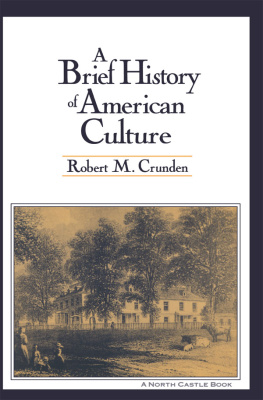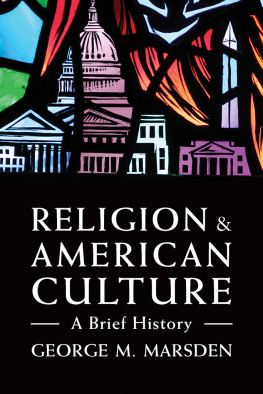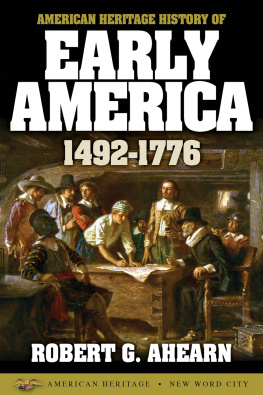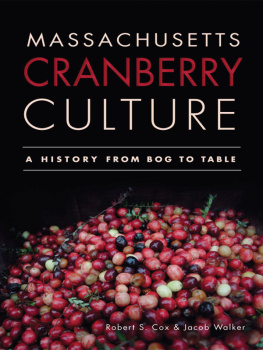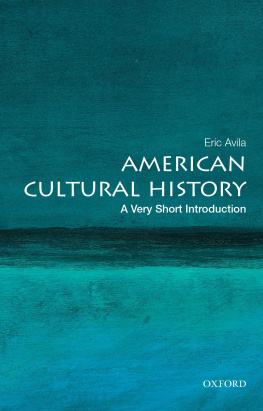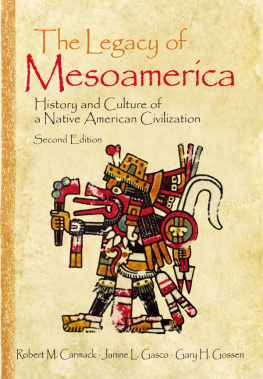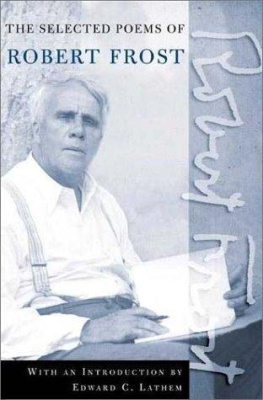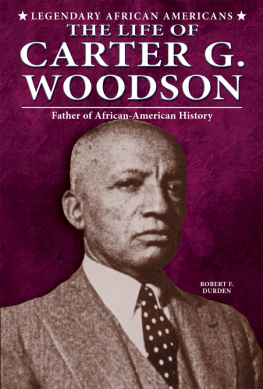A BRIEF
HISTORY OF
AMERICAN
CULTURE
ALSO BY ROBERT M. CRUNDEN
The Mind and Art of Albert Jay Nock
A Hero In Spite of Himself: Brand Whitlock In Art, Politics and War
From Self to Society, 19191941
Editor, The Superfluous Men: Conservative Critics of American Culture, 19001945
Ministers of Reform: The Progressives Achievement in American Civilization, 18891920
Editor, Traffic of Ideas Between India and America
American Salons: Encounters with European Modernism, 18851917
First published 1996 by M.E. Sharpe
Published 2015 by Routledge
2 Park Square, Milton Park, Abingdon, Oxon OX14 4RN
711 Third Avenue, New York, NY, 10017, USA
Routledge is an imprint of the Taylor & Francis Group, an informa business
Copyright 1996, Taylor & Francis. All rights reserved.
No part of this book may be reprinted or reproduced or utilised in any form or by any electronic, mechanical, or other means, now known or hereafter invented, including photocopying and recording, or in any information storage or retrieval system, without permission in writing from the publishers.
Notices
No responsibility is assumed by the publisher for any injury and/or damage to persons or property as a matter of products liability, negligence or otherwise, or from any use of operation of any methods, products, instructions or ideas contained in the material herein.
Practitioners and researchers must always rely on their own experience and knowledge in evaluating and using any information, methods, compounds, or experiments described herein. In using such information or methods they should be mindful of their own safety and the safety of others, including parties for whom they have a professional responsibility.
Product or corporate names may be trademarks or registered trademarks, and are used only for identification and explanation without intent to infringe.
Library of Congress Cataloging-in-Publication Data
Crunden, Robert Morse.
A brief history of American culture / Robert M. Crunden.
p. cm.
A North castle book.
Originally published: Helsinki : SHS, 1990.
Includes bibliographical references and index.
ISBN 1-56324-865-4 (pbk.)
1. United StatesCivilization.
I. Title.
E169.1.C8358 1996
306.0973dc20
96-3536
CIP
ISBN 13: 9781563248658 (pbk)
For Evelyn Anne Crunden and Rebecca Jane Crunden
Contents
PART I
A Local Culture, 16301815
PART II
A Sectional Culture, 18151901
PART III
The Northern Nation: From Religious to Capitalist Democracy, 18651917
PART IV
A National Culture, 19011941
PART V
A Cosmopolitan Culture, 1941-present
Culture can be a fighting word. For some it will always refer to the Victorian ideal of Matthew Arnold, of the best that has been thought and said in a given environment. More recent writers have rejected this view as literary and elitist and stressed a more anthropological notion of the complex behavior patterns of all people. I am not comfortable with either view, for neither seems to me to reflect what casual usage usually implies, especially casual usage outside the environment under analysis.
Several recent books have addressed the question without really settling anything. I would prefer to opt out of this kind of debate entirely, since in practice it too often reflects contemporary political concerns of the analysts without telling readers what they want to know. I define culture as creative achievements at any level: classical music as well as commercial innovation, much-admired novels as well as intricate thrillers. A cultural history is thus a record of the conditions that produced all kinds of innovation and of the behavior of individuals as they responded to those conditions.
The thesis this book argues is that American culture is essentially a peculiar mixture of Christianity, capitalism, and democracy, in that order. In terms of cultural influence, the dominant group of early settlers was puritan; so forceful were their personalities that they overpowered other influences, ranging from American Indians to Spanish missionaries. The practice of capitalism emerged under the domination of puritan religious values, and business long had religious sanction in ways that few European countries could or wanted to duplicate. Democratic practice emerged slowly, and in many ways democratic theory emerged from that practice. Few paid much formal attention to these processes as they evolved until the Revolution, during the 1770s and 1780s, forced everyone to rethink all aspects of American culture.
Among other accomplishments, the Civil War (18611865) fastened Northern religious, economic, and political ideas on a nation in no sense unanimous in accepting them. Such topics as the Protestant ethic, the American character, social Darwinism, and so on usually derive from this threefold heritage. Competitive groups, whether Southern cavalier, Southwestern Spanish, California Oriental, or European immigrant, have often challenged this dominant culture, but they have had to do so from the position of outsider. No one at the time questioned which cultural values predominated, even though many questioned their validity or beneficence. Since World War II things have become noticeably different, and historians have become much more careful in phraseology and capacity for generalization. But it needs stressing that while many peoples and values now constitute American democracy, the institutional framework for that democracy was set long ago, when the dominant cultural forces were at least outwardly more homogeneous.
The book also has a chronological organization that interacts with the thematic. It has five parts; although the dating is only approximate, the discussion often ranges outside the announced boundaries, and the emphasis may at first glance seem odd. The first part, from the beginnings to 1815, is the period of local culture. Settlements depended chiefly on England, not on each other; the indigenous activity that did occur developed from local adaptations of imported ideas, and intracontinental communications were poor. The American Revolution and its aftermath did much to forge a sense of national unity at the very top, but few people were aware of themselves as anything more than citizens of Newport or Charleston on a daily basis. The local communities of greatest creativity were Boston, from 1630 until the revolutionary turmoil of the 1770s; Philadelphia, from the beginning of the Age of Franklin around 1740 until the ascension of President Jefferson in 1801; and Virginia, that collection of localities without a center but symbolized by the Virginia dynasty in the White House from the inauguration of George Washington through the Peace of Ghent, with a dull afterglow of influence lingering into the 1820s with the Monroe administration.
The country was a sectional culture from 1815 until the inauguration of Theodore Roosevelt in 1901. It is the subject of two parts, one on the period when the North was distinct from the South and West, and a second one that examines in more detail the aspects of Northern culture which became national. The fighting of the second war against England and the events leading up to the first Missouri Compromise brought a new generation to prominence. Henry Clay, Daniel Webster, and John C. Calhoun clearly represented sections rather than cities, and in time the sections became identified with the acceptance or rejection of the institution of slavery. The key question became: Would Northern capitalism and individualism conquer the opening West, or would slavery, with all its economic, religious, and moral consequences, dominate? Whoever won would effectively control the country and the culture. The North won, and its efforts at reconstruction kept the South subordinate until 1877; economically, it remained subordinate for generations. Social Darwinism, pragmatism, the Gospel of Wealth, and so on are thus sectional concepts that became American because the North won the war.

